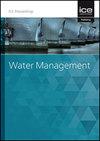基于参数化精英布谷鸟搜索算法的水库优化调度
IF 1.1
4区 工程技术
Q3 ENGINEERING, CIVIL
Proceedings of the Institution of Civil Engineers-Water Management
Pub Date : 2022-06-06
DOI:10.1680/jwama.21.00057
引用次数: 0
摘要
由于水流的不确定性,水库优化调度已成为一个具有挑战性的问题。水库优化调度框架在水资源管理中起着至关重要的作用。有效和明智地利用水库的水有助于管理缺水期。油藏优化的主要目标是设计可用于导出油藏释放实时决策的操作规则。本文将基于基本布谷鸟搜索算法的元启发式优化算法——参数精英布谷鸟搜索算法(PECSA)应用于印度Mahanadi水库工程综合体Ravishankar Sagar水库的优化调度决策。为了评价改进后的PECSA算法的性能,将其与另一种启发式的时变精英突变粒子群优化算法(TVEMPSO)以及标准的CSA和PSO方法进行了比较。PECSA改进了系统的运行,并且在实现更快的收敛速度方面优于其他方法。此外,PECSA与标准CSA在最佳释药模式上也有细微差异。最后,对研究结果的意义和进一步研究的建议进行了讨论。本文章由计算机程序翻译,如有差异,请以英文原文为准。
Optimal Reservoir Operation using Parametric Elitist Cuckoo Search Algorithm
Optimal reservoir operation has become a challenging problem due to streamflow uncertainties. Frameworks for optimal reservoir operation play a vital role in the management of water resources. Effective and judicious utilization of water from reservoirs helps to manage water deficit periods. The main objective in reservoir optimization is to design operating rules that can be used to derive real-time decisions on reservoir release. In this study a metaheuristic optimization algorithm, Parametric Elitist Cuckoo Search Algorithm (PECSA) based on basic Cuckoo Search Algorithm, has been applied for developing optimal operation decisions for Ravishankar Sagar reservoir in Mahanadi Reservoir Project complex, India. To evaluate the performance of the improved PECSA, the results obtained by this method has been compared with another heuristic method Time Variant Elitist Mutation Particle Swarm Optimization (TVEMPSO) algorithm and also with the standard CSA and PSO methods. PECSA improves system operation and has outperformed other methods in terms of achieving faster convergence rate. Besides, PECSA has also shown minor variations in optimal pattern of release policies with those obtained using the standard CSA. Finally, implication of the results and suggestion for further research are discussed.
求助全文
通过发布文献求助,成功后即可免费获取论文全文。
去求助
来源期刊
CiteScore
2.10
自引率
0.00%
发文量
28
审稿时长
6-12 weeks
期刊介绍:
Water Management publishes papers on all aspects of water treatment, water supply, river, wetland and catchment management, inland waterways and urban regeneration.
Topics covered: applied fluid dynamics and water (including supply, treatment and sewerage) and river engineering; together with the increasingly important fields of wetland and catchment management, groundwater and contaminated land, waterfront development and urban regeneration. The scope also covers hydroinformatics tools, risk and uncertainty methods, as well as environmental, social and economic issues relating to sustainable development.

 求助内容:
求助内容: 应助结果提醒方式:
应助结果提醒方式:


